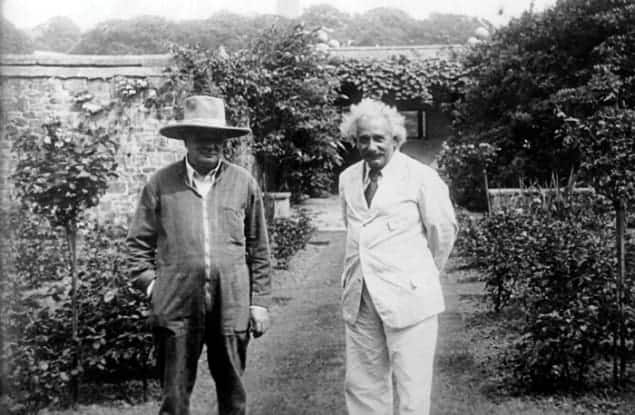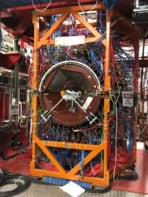Gerard DeGroot reviews:
Churchill’s Bomb: a Hidden History of Science, War and Politics
Graham Farmelo
2013 Faber & Faber/Basic Books £25.00/$29.99hb 576pp

In late May 1944 Niels Bohr met Winston Churchill to discuss the atom bomb. Certain that the new weapon – when it arrived – would completely transform great-power politics, Bohr wanted to alert Churchill to the hazards ahead. Churchill, who resented being lectured on international affairs by a scientist, rudely told Bohr to mind his own business. “What is he talking about, politics or physics?”, Churchill asked his science adviser, Frederick Lindemann. “This new bomb is just going to be bigger than our present bombs and involves no difference in the principles of war.”
Bohr did not perceive a dividing line between politics and physics; they were simply two interlocking elements in his comprehensive world view. Churchill, however, insisted that the two could, and should, be kept separate, which explains why he was reluctant to accept political advice from a scientist, unless (as was the case with Lindemann) the scientist’s opinions mirrored his own. Leaving that aside, Churchill’s retort to Bohr seems incredibly obtuse, especially from a man noted for his acute sensitivity to the wider implications of technology. As Graham Farmelo reveals in his intriguing book Churchill’s Bomb, Britain’s wartime prime minister was uncharacteristically myopic when it came to the bomb. Furthermore, his myopia probably proved costly for Britain – both in politics and in physics.
Before the war, the US lagged far behind Europe in atomic physics. The great strides were made in Cambridge, in Heidelberg and at Bohr’s laboratory in Copenhagen. When attention turned to the possibility of an atom bomb, the British were the early leaders, in part because of the contributions of refugee scientists from Central and Eastern Europe. The Frisch–Peierls Memorandum of 1940, which was drafted by two such émigrés, was the first practical exposition of an atom bomb and, significantly, an astute exploration of its political and military implications. That progress was confirmed the following year when the MAUD Committee, commissioned to explore the possibility of a British bomb, effectively provided a blueprint for one.
Progress up to this stage was, however, confined to theory. When the problem of the bomb morphed from theoretical to practical, the British encountered a technological challenge beyond their capacity in wartime. At this stage, American strengths became predominant, especially so when the US entered the war after the Japanese attack on Pearl Harbor. America alone had the natural resources, labour force and money to turn the theoretical bomb into an actual weapon.
At this point, British science and American technology might have been brought together in perfect harmony. Unfortunately, as Farmelo shows, Churchill squandered golden opportunities to derive maximum benefit from the early lead the British had enjoyed. In particular, he waited two months to reply to US president Franklin Roosevelt’s offer of partnership, made in the autumn of 1941. By the time he responded, Pearl Harbor had occurred, the American war machine was in top gear and Roosevelt no longer worried about keeping the British sweet. What might have been an Anglo-American project became instead an exclusively American one in which British scientists were individually offered jobs, if their expertise warranted. More importantly, it was made patently clear that the end result would be an American bomb, over which the British would have no control. This meant that if the British wanted a bomb of their own, they would have to start from scratch after the war.
Churchill’s failure to exploit the opportunities offered by the bomb appears strange in a man who was so keen to preserve British power past its logical shelf life. His clumsy handling of the bomb seems especially bizarre given his fascination with atomic power before the war, as evidenced by his friendships with Lindemann and H G Wells and by his musings in the popular press. It is refreshing to read a book so critical of Churchill, given the worship he customarily receives. Churchill’s Bomb is a story of abject failure by the man widely considered to be the greatest Briton ever to have lived. While there is nothing particularly new in this book, its brilliance lies in the way the story is told, for it is a tale not just of physics or politics but also, more importantly, of people.
Farmelo exposes the abundant errors Churchill made in formulating nuclear policy. However, he is less adept at explaining those failures. Why, in other words, did the man best situated to exploit the new weapon fail to do so? It would be easy to argue that Churchill was distracted by the war: the real threat of invasion might have caused him to ignore theoretical possibilities like the bomb. Such an excuse would, however, be too charitable given that Churchill frequently allowed himself to be diverted by far less important abstractions, like bizarre suggestions for new weapons that were physically impossible. The explanation in part lies with Lindemann, a distinctly average physicist who had far too much influence over the prime minister. J Robert Oppenheimer was one of many physicists to be amazed by the limits of what Lindemann understood. Yet, in this case, the fault lies with Churchill for choosing an adviser who would echo his views rather than challenge them.
In my view, the best explanation for Churchill’s failure to exploit British atomic expertise lies in his inability to understand the modern world and the role of the Americans within it. The qualities that made him a brilliant war leader also rendered him incapable of coming to terms with the future. His romantic conceptions of British greatness were perfectly suited to the heroic struggle he presided over in the first three years of the war. They proved an impediment, however, when it came to carving out a role for Britain in the age of the atom.
The American version of this book is subtitled How the United States Overtook Britain in the First Nuclear Arms Race. The difference in subtitles speaks volumes about how the division of power in the atomic age played out. In truth, the opportunities for Britain to take a larger role – which Farmelo effectively implies – might never have existed. Roosevelt and his successor, Harry Truman, were fully aware of the implications of American might, especially now that her supremacy was punctuated with atomic weapons. Churchill thought that British prestige would trump American power. He was wrong – disastrously so – since the Americans didn’t give a fig for how great the British had once been. While Churchill undoubtedly mishandled nuclear politics, no British leader, no matter how perceptive, could have stopped the Americans from strutting on the atomic stage.



